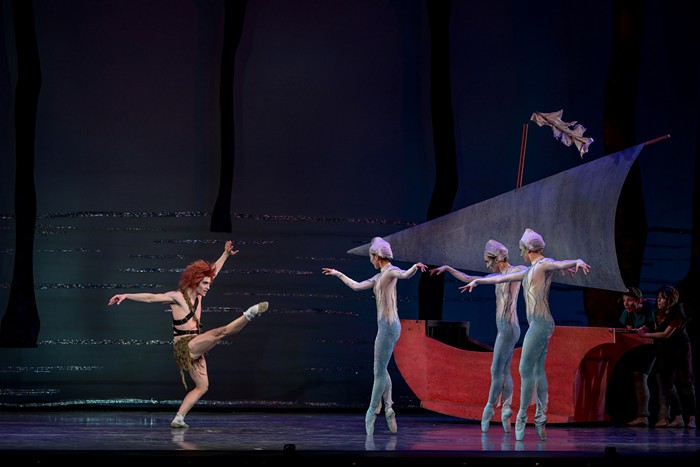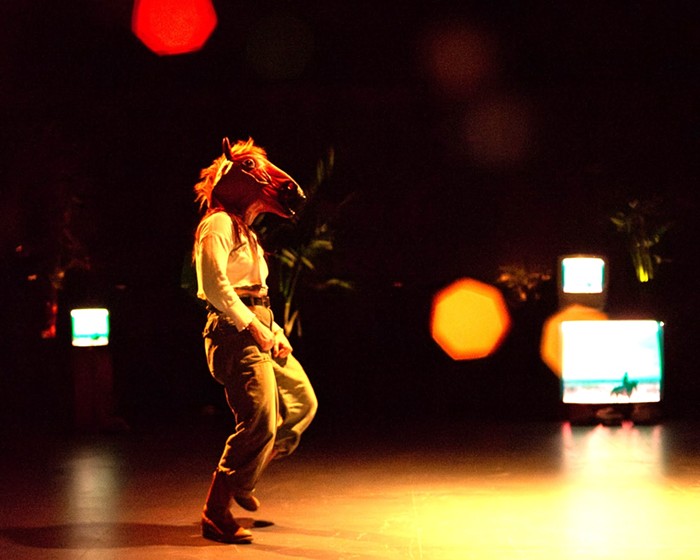runs Thurs-Sat 8-10 pm, Portland Art Center, 2045 SE Belmont, 890-2993, $6-10 pay-what-you-can, through June 18. The unattended Resurrectory space is open for public viewing Wed-Sat, noon-6 pm.
It's rare that a story about a fringe theater company makes it out of the Mercury's fine arts section and into our illustrious and internationally renowned feature space, but then the Liminal Performance Group is no typical fringe theater company. I've written such cliché of glowing praise before about Liminal, as has nearly every newspaper in this godforsaken town, but I really want you to listen this time, because chances are, you didn't listen in the past (in this cruel modern age, even the best samplings of live theater only reach a tiny fraction of the population) and if you don't listen this time, well, that might be it, at least for a good, long time. After their new, upcoming show, The Resurrectory, ends its run. Liminal artistic director Bryan Markovitz is leaving town to pursue an MFA program at the prestigious Chicago Art Institute.
Liminal has several different key contributors--in particular, movement specialist Amanda Boekelheide and cofounder/sound designer John Berendzen--but the driving force behind the company's eight-year saga has always been Markovitz, who possesses the exceedingly rare combination of genuinely unique creative vision and uncanny business savvy. A longtime fundraiser and marketing developer for various nonprofits, he's organized (again: rare in the theater world) and knows how to get people interested in his product. The Resurrectory alone boasts a lineup that includes illustrations and set work by the amazing visual artist Gabriel Liston, an appearance by the renowned performance poet David Abel, and local darling filmmaker Jim Blashfield handling lights and video projections. Markovitz has become a sun around which a solar system of planets revolves, but what happens to a solar system when the sun winks out?
"It might not be 'Bye-bye Liminal,'" Markovitz recently told me, referring to the possibility of guest directors continuing the Liminal legacy in Portland, of upcoming projects in Chicago, and of his allegedly inevitable return to Oregon after finishing school. He has good reason to be optimistic. If there's any theater company in town with the potential to be self-sufficient in its leader's absence, it's Liminal, a group that in addition to having the most fiercely loyal members imaginable, operates under a set of rules and with an artistic vocabulary that is entirely its own, and far outside the boundaries of "normal" theater. Simply put, Liminal has created an identity for itself that might just stand the test of time.
Liminal productions combine every creative medium imaginable, from visual art, to sound engineering, to intense choreography, to film projection--but then that description applies to a lot of experimental art ensembles in this day and age, and doesn't begin to explain what Liminal really does. Though Liminal is certainly a theater company, their productions are not "plays" in any sense of the word; if anything, they are "anti-plays," fully interactive deconstructions of "plays" that don't just make the viewer a part of the action, but force the viewer to ponder what it means to have action at all. Past "Liminal events" include Objects for the Emancipated Consumer, which led the audience through a fictitious airport terminal as company members enacted an elaborate mystery plot; The Seven Deadly Sins, an electro-sleaze update of Kurt Weill's epic opera brought to life in the dark corridors of the gay club Panorama; and Three Plays, Five Lives, an explosion of incredibly intense physical movement and wordplay that cohered to tell three different stories… simultaneously.
Each new Liminal work has found new ways to subvert live performance and engage the audience. The Resurrectory is both a continuation and a culmination of that journey. A fully interactive experience, the project transforms the brand new Portland Art Center into "a sordid Victorian theater of human anatomy and criminal investigation." Markovitz and Co. based the piece on a real-life 19th-century killing spree in Scotland wherein the victims were lulled into a drunken stupor, brutally murdered, then sold to physicians who needed the cadavers for anatomical research. The Resurrectory is not so much a show inside a venue; rather, the venue is the show. By opening night (May 5) Liminal will have converted the Portland Art Center into a fully operational facility of death. Murder reenactments and grisly cadaver dissection will be ongoing, and in one corner a records keeper (Alex Reagan) will struggle to document the crimes, tracking each one on a large-scale city map on the wall. The Resurrectory is an evolving exhibit, and repeat viewings will be rewarded with new evidence, new ephemera, new interpretations, and most importantly… new killings.
At a recent rehearsal, I watched the Liminal company work on a scene--one of the 108 murders that will unfold during the show's six-week run. The Art Center space was in shambles and the actors were still adjusting to a ramped stage that had just been installed. They moved deliberately and slowly through different points of the murder and subsequent dissection, transitioning in flurries of Liminal's signature detail-oriented choreography. Markovitz moved about the space, interjecting with notes, but also shuffling papers or checking his cell phone. He seemed both engaged and distracted, and the air in the room was somehow both rigorous and disarming. Like any great leader, Markovitz exudes an aura of absolute confidence. He never raises his voice because he knows people will listen when he talks, and they do. He feels comfortable turning away from the action momentarily because he knows the cast will continue to work during his absence, and they do. Watching how easily he operated, the unassuming respect and adoration he commanded from cast and crew, I felt sad about his pending departure, but excited for his promised return. He will sharpen his already acute natural tools at the Art Institute of Chicago and he will make national connections, and when he returns there will truly be no limits to what he and Liminal can do.
Broken by fits of discovery and discussion, the Resurrectory rehearsal plodded on, until suddenly a fluid sequence unfolded, a drunken seduction dance that commenced with victim Jacob Coleman bent backwards, Jeff Marchant's hand suffocating him with stylized horror. The inarguable creepiness of the moment cut through the disarray of the space, the show's raw potential suddenly flashing brightly despite the buzzing florescent lights and unfinished set. Markovitz stood focused in this moment, watching, arms crossed, glasses straightened, well aware of when the planets are aligned.


















